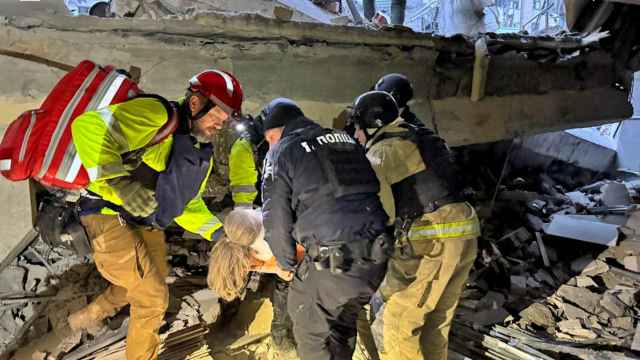Galina Kozhevnikova, a rights activist and leading researcher on nationalism and xenophobia, died of cancer Saturday at the age of 36.
A funeral will be held Wednesday and will be closed to the public, Interfax said, citing her colleagues.
Kozhevnikova, who was to turn 37 next Wednesday, was a co-founder and deputy director at the Sova think tank, created with the help of the Moscow Helsinki Group in 2002.
A graduate of the Moscow-based Russian State University for the Humanities, she worked at Panorama, another think tank, in the mid-1990s before creating Sova together with its current head, Alexander Verkhovsky.
Her regular reports on Russian nationalism made her a target of threats from various radical groups — whose rallies she was not afraid of attending, Panorama head Vladimir Pribylovsky told The Moscow Times on Tuesday.
She never faced actual violence, but had to relocate once to a safe house under police custody, Pribylovsky said.
"She was a good, kind and truly brave person," he said.
Kozhevnikova had admitted in the past to not being fearless, but that did not keep her from doing her job.
"Of course, I'm scared, but I'm used to distinguishing fear and cowardice, and the self-preservation instinct won't make me abandon my favorite job," she said in a 2009 interview after she received e-mailed threats over her work.
Sova will release Kozhevnikova's last report — dealing with ultranationalism in Russia in 2010 — on Thursday, the think tank said on its web site.
Kozhevnikova "departed after a severe illness but continued working until the last moment," her Sova colleagues said in an online obituary.
A Message from The Moscow Times:
Dear readers,
We are facing unprecedented challenges. Russia's Prosecutor General's Office has designated The Moscow Times as an "undesirable" organization, criminalizing our work and putting our staff at risk of prosecution. This follows our earlier unjust labeling as a "foreign agent."
These actions are direct attempts to silence independent journalism in Russia. The authorities claim our work "discredits the decisions of the Russian leadership." We see things differently: we strive to provide accurate, unbiased reporting on Russia.
We, the journalists of The Moscow Times, refuse to be silenced. But to continue our work, we need your help.
Your support, no matter how small, makes a world of difference. If you can, please support us monthly starting from just $2. It's quick to set up, and every contribution makes a significant impact.
By supporting The Moscow Times, you're defending open, independent journalism in the face of repression. Thank you for standing with us.
Remind me later.





